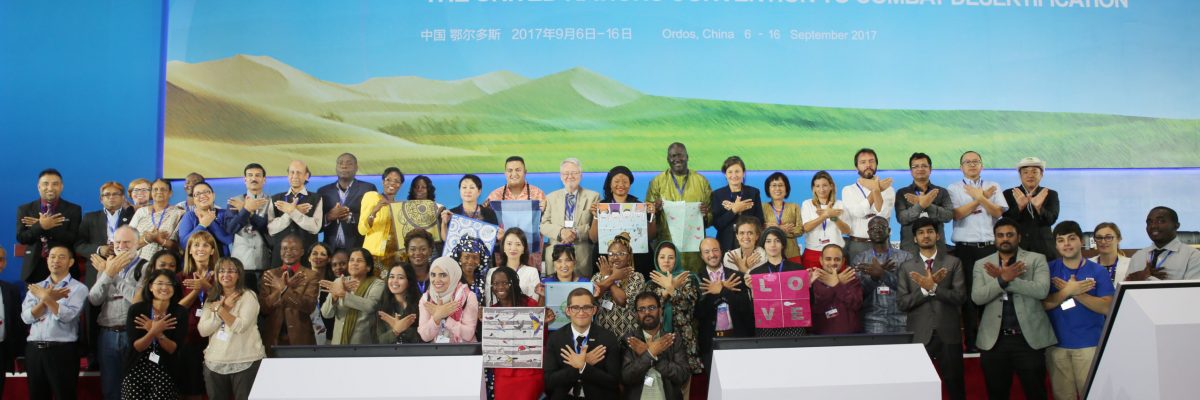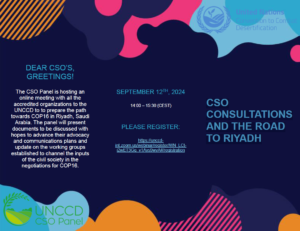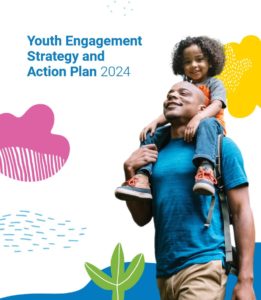We, civil society organizations (CSOs), representing more than 500 CSOs accredited to the United Nations Convention to Combat Desertification (UNCCD), gathered for the thirteenth session of the Conference of the Parties (COP 13) held from 6 to 16 September 2017 in Ordos, China, hereby express our appreciation to the Government of the People’s Republic of China and its friendly citizens for hosting us in this beautiful city of Ordos, to the UNCCD secretariat for their unwavering support to CSOs, and to the Governments of China, Switzerland and Turkey for their financial support to the Civil Society Organization Panel (CSO Panel) and for enabling significant CSO participation in COP 13.
Civil society welcomes decision ICCD/COP(13)/L.10 in support of CSO participation in the UNCCD, and in particular the planned renewal of the CSO Panel. This decision recognizes the vital role played by civil society in realizing the objectives of this Convention, and we welcome the contributions of the accredited CSOs from the host country and from around the world that enriched the discourse in Ordos and contributed to the comprehensive outcomes. The CSOs contributed 18 statements in the course of the COP that also reflected the perspectives of affected populations and the spirit of Article 5 (d) of the Convention, which obliges Parties to “facilitate the participation of local populations, particularly women and youth, with the support of non governmental organizations, in efforts to combat desertification”.
We endorse the recommendations of the CSO Panel regarding land rights contained in chapter III of document ICCD/COP(13)/15, and note that Article 8 of the Convention requires the inclusion in national action programmes of measures to improve the institutional and regulatory framework of natural resource management to provide security of land tenure for local populations. In this context, we further welcome the inclusion in decision ICCD/COP(13)/L.10 of the invitation to Parties to consider the recommendations made by the CSO Panel regarding land rights. In this context, we urge Parties to ensure the full participation of local land users in the rehabilitation and sustainable management of land and, in this context, recall:
• That the lack of enforceable land user rights and tenure security is a significant driver of land degradation and migration, and is a triggering factor of conflicts;
• The United Nations Declaration on the Rights of Indigenous Peoples, particularly its Article 26, stating that indigenous peoples have the right to the lands which they have traditionally owned, occupied or otherwise used or acquired and that countries shall give legal recognition and protection to these lands, and Article 32 referring to the right to free, prior and informed consent;
• The General Recommendation N° 34 on the rights of rural women of the Committee on the Elimination of Discrimination against Women of United Nations Convention on the Elimination of All Forms of Discrimination against Women (CEDAW), which obliges Parties to take all necessary measures, including temporary special measures, to achieve the substantive equality of rural women in relation to land and natural resources;
• The Voluntary Guidelines on the Responsible Governance of Tenure of Land, Fisheries and Forests in the Context of National Food Security, which provide a sound and legitimate framework for good land governance and strengthened land tenure rights.
Civil society calls upon Parties to actively promote effective partnerships with CSOs for the implementation of the UNCCD 2018–2030 Strategic Framework and to support the engagement of local land and natural resources users, particularly women, indigenous peoples, pastoralists and youth in the operationalization of land degradation neutrality (LDN).
We therefore welcome the decision to adopt the UNCCD 2018–2030 Strategic Framework (ICCD/COP(13)/L.18) and its call on stakeholders to take into account the need for gender-responsive policies and measures, strive to ensure participation of men and women in planning, decision-making and implementation at all levels, and enhance the empowerment of women, girls and youth in the affected areas; and the encouragement to Parties to further enhance the involvement of civil society in the implementation of the Convention and of the Strategic Framework.
We call upon all Parties to reaffirm their commitment to the 2030 Agenda for Sustainable Development, including target 15.3 to achieve LDN. In striving to achieve Sustainable Development Goal (SDG) target 15.3, Parties must recognize that land rights have been included in the targets of SDGs 1, 2, 5, 12, 14 and 16, and that in order to holistically address the 2030 Agenda, the interconnected character of all 17 goals must be considered and the ‘leave no one behind’ principle must be adhered to.
We therefore invite Parties to integrate the promotion of land tenure security into their national action programmes and in the operationalization of LDN and to adopt and implement the Voluntary Guidelines on the Responsible Governance of Tenure of Land, Fisheries and Forests in the Context of National Food Security to guide their policies related to land tenure security and for the implementation of LDN.
Recalling the importance of anchoring science in territories affected by desertification to ensure the better development of scientific research programmes that strengthen local knowledge, especially that of indigenous peoples, the civil society welcomes the adoption of the synthesis report on sustainable land management (SLM) by the Science-Policy Interface (SPI) (ICCD/COP(13)/CST/3), urges Parties to support national and local science-policy interfaces and urges the SPI to interact with scientific networks.
We welcome the adoption of the text related to gender equity and urge the Parties to implement the Gender Action Plan of the UNCCD at national level and to monitor and report on the progress of its implementation.
The CSOs recognize the valuable role of private funding to achieve LDN targets, but we nevertheless must stress that its participation in financing initiatives under this Convention must adhere to the highest human, social and environmental standards and protect the interests of pastoralists, farmers, indigenous peoples, women and landless peasants. In this context, the Land Degradation Neutrality Fund (LDN Fund) must comply with the highest human, social and environmental standards. The perspective of civil society with regard to the implementation of private-led initiatives and the activities that will be developed by the private sector under the framework of the Convention, particularly those related to the funding of transformative projects for achieving LDN targets, must ensure the engagement of representatives of accredited CSOs. We strongly urge the secretariat to ensure the participation of at least one representative of a CSO accredited to the Convention, to be elected by the CSO Panel, on the Advisory Board of the LDN Fund so as to enable the effective engagement of the CSO community in contributing its expertise to the governance and policymaking processes of the LDN Fund.
We are deeply concerned by the potential conflicts of interest that could arise in engaging the private sector in funding mechanisms in this Convention, and we call upon the Parties to ensure that private funding of UNCCD processes is managed in a transparent manner and with regular and transparent reporting procedures. The participation of the private sector in contributing financial resources towards achieving LDN targets should not be considered as a replacement of public funding, which is fundamental to achieving the goals of the Convention.
In conclusion, we congratulate the Parties on the adoption of a sound decision text at COP 13 and call upon the Parties to engage fully and effectively with CSOs in the implementation of the UNCCD 2018–2030 Strategic Framework, and to ensure the adoption of a decision on land rights under this Convention at COP 14.






